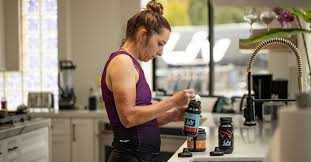Electrolyte Supplements for Runners and Cyclists
Endurance athletes know that water alone isn’t always enough—especially during long runs or rides.

Endurance athletes know that water alone isn’t always enough—especially during long runs or rides. When you sweat, you lose essential minerals like sodium, potassium, magnesium, and calcium. Without replacing them, dehydration, cramps, fatigue, and even dizziness can set in fast.
That’s where electrolyte supplements come in. Designed to replenish what you lose through sweat, these supplements are key for performance, recovery, and safety—particularly for runners and cyclists.
Here’s everything you need to know about electrolyte supplements, and how to choose the right one for your endurance training.
What Are Electrolytes?
Electrolytes are minerals that carry electrical charges in your body and help:
- Regulate fluid balance
- Support nerve and muscle function
- Maintain proper pH levels
- Prevent dehydration and cramping
Main electrolytes lost in sweat:
- Sodium – Most abundant; crucial for hydration and fluid balance
- Potassium – Prevents muscle cramps and regulates heart rhythm
- Magnesium – Supports muscle recovery and energy production
- Calcium – Aids in muscle contraction and nerve signaling
- Chloride – Helps maintain fluid pressure and pH balance
Why Runners and Cyclists Need Electrolytes
Whether you’re running long distances or biking under the sun, your body loses fluid rapidly. Dehydration leads to:
- Reduced stamina and power output
- Muscle cramps and fatigue
- Impaired focus and coordination
- Slower recovery
Electrolyte supplements help you:
- Rehydrate faster
- Maintain endurance
- Reduce risk of cramps
- Keep core body temperature regulated
- Recover more efficiently post-exercise
Signs You Need Electrolyte Support
- Muscle cramps during or after workouts
- Headaches or dizziness after long runs/rides
- Feeling drained despite eating and sleeping well
- Salt stains on clothing post-workout
- Frequent thirst or dry mouth during endurance sessions
Types of Electrolyte Supplements
1. Electrolyte Powders
Mix with water; ideal for customizing dose and hydration level.
Pros:
- Lightweight for travel or race day
- Easy to mix and flavor-adjust
- Often includes carbs for energy during endurance events
Best for: Long rides or races where consistent hydration is critical
2. Electrolyte Tablets
Drop into water like a fizzy tablet; great for quick, on-the-go hydration.
Pros:
- Pre-measured and portable
- Low calorie and sugar options
- No messy powders
Best for: Short to moderate workouts or travel use
3. Ready-to-Drink (RTD) Electrolyte Drinks
Pre-packaged drinks containing electrolytes and sometimes carbs.
Pros:
- Convenient and time-saving
- Widely available in stores
- Some formulas support energy and focus
Best for: Rehydration after workouts or races when convenience matters
4. Electrolyte Capsules
Taken like a supplement with water.
Pros:
- No flavor or sugar
- Easy to carry in pill cases
- Great for those who don’t like sweet drinks
Best for: Long events where hydration needs to be measured precisely
Key Ingredients to Look For
When shopping for electrolyte supplements, check for:
- At least 250–500 mg sodium per serving
- Potassium (100–200 mg)
- Magnesium (30–100 mg)
- Calcium (50–150 mg)
- No artificial sweeteners or dyes
- Low sugar (unless used for energy boost during long workouts)
Bonus nutrients: B vitamins for energy, zinc for immunity, or amino acids for recovery.
When and How to Take Electrolytes
- Before workout: Start hydrated. Drink electrolytes if it’s hot or you sweat heavily.
- During workout: For activities longer than 60 minutes, sip every 20–30 minutes.
- After workout: Use electrolytes to replace what you lost and kickstart recovery.
Hydration isn't just about drinking water—it’s about retaining it. Electrolytes help your body absorb and use water more efficiently.
Sample Electrolyte Plan for Runners and Cyclists
Before a 10k run or 30-minute ride:
- 8–12 oz water with electrolyte powder or tablet
During a 60+ min session:
- 4–8 oz every 20–30 minutes with sodium, potassium, and carbs
After training:
- Rehydrate with an electrolyte-rich drink
- Pair with protein and carbs for full recovery
Final Thoughts
Electrolyte supplements are a small but powerful tool in any endurance athlete’s kit. They support hydration, prevent cramping, and keep your body functioning at its best—especially during long, sweaty sessions.
Choose a product that fits your training style, flavor preference, and tolerance for sugar or caffeine. With consistent use, you’ll likely notice better stamina, smoother recoveries, and fewer hydration-related setbacks.